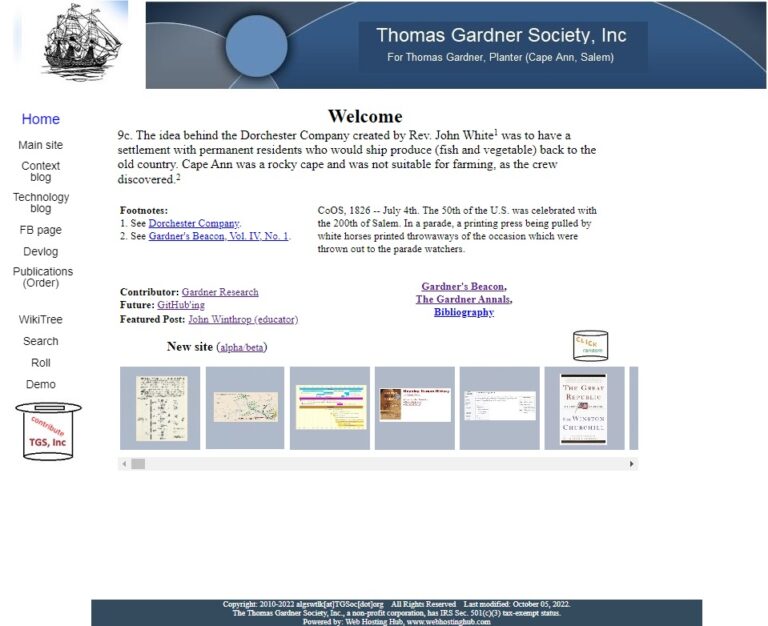TL;DR -- We left MS in 2012 having gotten started with them in 2010. We are now back to using them, only slightly for a while. We are reconfiguring with some final sense in mind now, after a decade long trek through the hoopla and confusing goings on that one sees with respect to computing. Silly valley is what comes to mind every time we look deeply. That needs to change.
---
When we started the TGS work on information conveyance, we were using Microsoft's Officelive which was quite capable and familiar to anyone who had worked through the era of Windows evolution. Of course, there were other OS options; too, Unix was very much part of the technical camp. Then, there was the decision to go to Office 365.
Since we had been working pro bono for a decade, we opted out. Too, though there was the 'freebie' mode everywhere, we all know the consequences of that. We might have had blogger going, we did not use the Ad facility. Of course, we looked at it.
John's forte has been advanced computing for decades and has watched the changes, many of which seem to be more immature than not. Again, look around. Messes everywhere. Now, need that have been? It's arguable, of course, but John will throw 'truth engineering' on the table and say let's discuss this. Well, rather than descend into an academically-oriented bit of discussion, we need to work these computer issues in ways other than what we see, at least in part.
There has been a lot of discussion along these lines that we can pull together. For now, let's say that the Thomas Gardner Society, Inc. has a goal to be a positive contributor in this area without defining things specifically enough to cause limits. After all, about anywhere one looks deeply, there are issues. These have gotten worse over the years.
Think that this will abate?
Of the whole ball of wax, "content vs configuration" is one thing to talk about. There are related themes that will come up. One might even say memes since this idea has spread across the internet. Okay, after MS's decision, we went looking and settled on Linux as a proper way to go. That is, for the server affairs to support what we wanted to do. You know, the cloud? Lots of problems. We'll discuss. After all, all of the decisions made were documented as we went along. There are lots of threads which can be used for various purposes, including analysis on several fronts.
One set of choices was to find something that did as well as MS's tools. Well, we didn't find any that stood out. This is still true. But, we have watched what people have done, across the board. Opinions? Yes, they are there. We'll get to talking about the state of the computing world (have lots of these types of thing already) within the context of what we are doing here. That type of discussion goes along with the choice patterns and why they are as they are.
Now, it was a decade ago that we went off of MS's planet and started our own thing. The first iteration was hard-coded HTML with a little CSS and loads of icons taken from the MS screens that we had. That worked for a bit. Why? It allowed the configuration aspects to be made steady in order to do content work. Mind you, this is always a dynamic.
One can talk of floors in the sense that one person's configuration is another's content. Say, you're a user of some mobile device (say phone). Do you ever think of what happens as you push buttons in some context with a goal or goals to accomplish? We can look at that at any level. But, one good metaphor is that we walk on a stage under which is a very large collection of abilities taken for granted. To get into details, we have to open some door and enter.
Or, stoop to conquer. One doesn't get anything done if the hands can't get dirty.
John says, that the immaturity that we see can be discussed so as to talk ways and means to correct the issues. Is there a suggestion that this stuff is easy? Nope. Actually, it is. There are various viewpoints, many of which cannot even converse. You see, even technical modes and data driven thingees have their troubles. Many times these are settled by power or any other of an endless set of human talents.
We'll cover all of this in time. For now, we are going to use WordPress, for several reasons, to provide a platform (software and technique) with which to organize what we need to do. The underlying power will still come from our virtual machines running Linux. At the same time, we will pursue Android modes, using approaches that are general and which ought to work in any of the venues that covers the basic set that everyone agrees upon.
But, higher-order content must have specifics that differ, unfortunately, amidst all of these things that look monolithic even if that's a mirage (as hackers will tell us).
You know, that is part of the discussion. WP has Apple'ness on its plate. It is that universal situation that we are looking for. Of course, others do too. I know of one case where the national group uses one and some regionals use another, including WordPress.
It's funny to consider what AIn't is bringing, or not, to the work. We'll look at that, deeply (in the true sense that the DL folks pirated) and broadly. After all, if one talks machine learning, it's quite legit and rational.
Expect this to be fun.
Aside: Paying attention? Old guy off the wall? Well, no, here is a current discussion of
Concrete CMS versus Wordpress. Of course, it is from Concrete CMS's viewpoint. You see, 'new infrastructure' points to changes that will be permanent. Users want more control. Developers want tools. Content creators and managers want ease of applying power. Finally, John can say, about time. Maturity?
Remarks: Modified: 10/07/2022
10/07/2022 -- Need to organize the material on content management and updated the story of this versus configuration management (see
Sept 2019 post on the new infrastructure and what it entails and a lot more - which was pre-COVID). If you look at the post from 2019, you will see a graphic that notes the advent of Elementor which uses the fleixability of WordPress in a mode that is 'drag and drop' development. Lots to discuss about the approaches and what is beneath the abilities and more through time (hence our reminders of what has been done so far and why).
After looking at discussions about WordPress,
ConcreteCMS and Drupal, we can add to the debate, from our WordPress-supported position. Of course, which of these will be better is an open issue. We have compared the 'stories' and the types of users. They all have a mix. Our view is technical, though we are doing the work for TGS, Inc.
We will be redoing this page (at our
portal to truth) so that it can be a trace for future analysis. Our words.
- Note (10/07/2022): Final technical note, after looking at Concrete CMS and Drupal. These were considered earlier and have progressed as has WordPress. And, each of the three have solid use by well-known customers who have access to talent. As we work our configuration, we will be looking more than slightly as the issues which is best done with multiple parties to inspect. Say, like the infamous flyoff when new technology is being assessed. This type of thing is going to be even harder for computing. That is, bridging the cognitive gaps (or hats). Our put is called truth engineering. The ability to think of bare metal went away with the newer methods. Is there some equivalence? Too, the internet's evolution can now been seen more readily given the experiences of the last half decade. For instance, we can point to one paper discussing Concrete CMS versus WordPress, from the viewpoint of the former. Then, we have what we call AIn't coming forth. What we have here is mathematics and parameters mixing in an unlimited number of ways. WordPress, Concrete CMS, and Drupal represent parametric modes that are phenomenally complicated. This (the potential error) is covered over. We'll explain. And so, we have the situation where there is not human talent with the evolutionary wherewithal to handle the issues, except as a guider of the AIn't ways, if they are done correctly. ... It's almost like we've stood still the past decade and one-half with lots and lots of noise being added. Where is the value if only marketing is thought to be the major player? Tsk.








